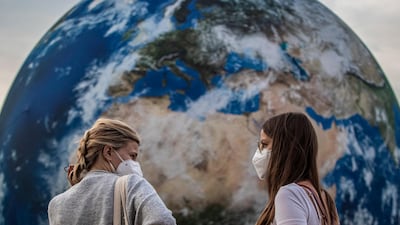Multilateral institutional support and increased international co-operation are needed to achieve the UN’s 2030 sustainable development goals (SGDs) amid a global economic slowdown driven by Covid-19, the deputy managing director of the International Monetary Fund said.
“It is time now for global co-operation and multilateral co-ordination. Yet, this has been slow to happen,” Tao Zhang said on Monday at the 2020 International Conference on Sustainable Development (ICSD).
Multilateral organisations need to “up our game” to help achieve these targets, he said.
“We have to be nimble, responding quickly to a fast-changing landscape. And we have to be innovative,” Mr Zhang said.
The UN's 17 SDGs include reducing carbon emissions, promoting responsible consumption and developing affordable clean energy.
Current mitigation pledges fall well short of what is needed to meet the Paris Agreement’s objective of limiting global warming to 1.5 to 2 degrees centigrade. Global carbon prices average $2 per tonne, and they likely need to go up to $75 per tonne to make an impact, Mr Zhang told the ICSD – a global event for academia, governments, UN agencies and the private sector to discuss progress on meeting SDGs.
“Acting unilaterally, countries do not have enough incentives to scale up their mitigation [efforts],” he said.
The IMF executive also said that developing countries are likely to suffer lasting economic damage as a result of the pandemic and need international support to meet SDGs.
Even before Covid-19 sent shockwaves through the global economy, a major scaling up of international assistance for less developed countries was needed, he added.
Advanced economies have boosted fiscal spending by almost 9 percentage points of their gross domestic product in response to the pandemic, while emerging economies increased spending by 4 per cent. Developing countries, on the other hand, were only able to provide stimulus measures equating to about 2 per cent of GDP on average to fight the crisis.
“Governments in developing countries have very limited resources to respond to the crisis,” Mr Zhang said.
While governments in the developing world will have to act in terms of raising taxes and allocating spending appropriately to meet climate goals, bilateral donors will also need to step up assistance to poorer nations.
Multilateral institutions, such as the IMF and World Bank, also have a key role in helping these countries in terms of financing projects and meeting liquidity needs. Some countries may also need to restructure their debt as the emerge from the current crisis, he said.
Governments and private sector investors globally need to spend between $3.3 trillion to $4.5tn (Dh12.1tn-Dh16.5tn) a year to reach the UN's sustainable goals by 2030. However, there is currently a spending gap of about $2.5tn a year, according to United Nations Conference on Trade and Development data.
Bridging that financing gap has become more difficult as a result of the pandemic, which has tipped the global economy into its deepest recession since the Great Depression. The IMF forecasts the world economy will shrink 4.9 per cent this year while the World Bank estimates it is likely to contract 5.2 per cent.
The IMF, along with the World Bank, has led calls for an extension of debt relief by the G20 nations for the poorest countries. The fund has provided a record amount of assistance to developing nations to combat the economic fallout from the pandemic.
The fund has devoted substantial resources to climate change, inequality, gender, governance, social spending and FinTech initiatives, among others, to help these nations achieve SDGs, Mr Zhang said.
“We have realised over the past few years that we cannot adequately fulfil our core mandate of ensuring global macroeconomic stability if we ignore these critical issues that countries are grappling with,” he said.
“Without a doubt, there is much more that we can do. And the same is true for other international organisations, which also have stepped up but need to go further.”
The world, he said, needs to forge new partnerships to bring in other players, including private sector investors, donors and civil society.


